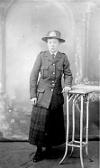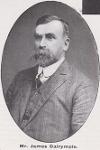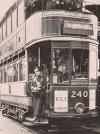Eliza Orr
Their names will be remembered for evermore
Having large families and housework that could take all day didn't stop women applying in their thousands to work on Glasgow's trams. Despite their back-breaking world of housework and childcare, women like Eliza Orr were keen to help the war effort. When a crisis in staffing meant the trams struggled to take the city to work, Eliza and others leapt at the chance to help, and at the new opportunities.
Crisis in Workforce
Glasgow's trams were losing staff rapidly as men joined up, and there weren't enough to cover shifts. Industry relied on people being able to travel, and cuts in tram services posed potentially serious problems for shipyards, factories and other employers. With the war effort depending on heavy industry, it was a problem Glasgow Corporation took very seriously, and in spring 1915, it began recruiting women to work as conductors, the first transport department in Britain to do so.
Women join the War Effort
Paid work done by women had traditionally fitted around childcare and domestic duties. But by 1915, there was no longer room for reluctance to employ women in roles away from the home. Although started as a trial, the recruitment of women was hugely successful. There were over 800 women conductors in the city by October 1915, and applications were arriving by the thousands. It was just as well - one year into the war, almost half the male staff on the trams had enlisted - 2,178 of 4,672. The women got the same pay as men, and same conditions. The tramways manager, James Dalrymple, who had said the staff crisis left bosses "at the end of our tether", was relieved at how "altogether satisfactory" the 818 women conductors were, "strong physically, and knew what it was to do a day's work."
Most of those women were from working class backgrounds, often with large families. Eliza was one of family of 12 raised in Gorbals. By 1915 she was married with two small children. Although she was expecting a third, she was keen to return to work and, according to family recollections, felt working on the trams was an important contribution to the war effort.
By the end of 1915, the extended family, still living in Gorbals, were heavily involved in the tramways. Eliza's sister Williamina, whose husband had died that year serving in France with The Royal Scots Fusiliers, was a tram cleaner. Living round the corner from her mother Maria, Eliza had to get her children up, fed, and round to their grandmother's in Commercial Street before heading out for her shift. She had her own housework to do, and it was heavy. Family laundry took a day, with water heated in pans over a fire, and cooking was done on a range with none of the speed and convenience of today's kitchens. Despite this, women of the day undertook long hours outside the home - there was no distinction between their working conditions and those of the men they replaced on the trams, with a 51-hour working week.
A wave of Opportunity
In another experiment, Glasgow began trialling women as drivers, and Eliza became one in 1916. Her husband Willie, a lithographic printer, had been exempt from conscription until the age categories changed. He enlisted in 1917 and worked at ports, serving with The Royal Engineers at Chatham Naval Dockyard in Kent. Eliza, who had a fourth child in 1918, went back to work as soon as she could, and family accounts recall her pride at being part of the wave of new opportunity for women that saw them given the vote and have the chance to work outside the home.
View original referenced text here:Eliza Orr (PDF, 119 KB)(opens new window)
Images:
- Eliza Orr, in her tramway conductor's uniform. Credit: Courtesy of Ian and Alice Semple Collection of Glasgow.
- James Dalrymple, the tramways manager appointed 1904, whose department was the first in Britain to allow women to work first as conductors, and then as tram drivers. Credit: Strothers's Glasgow, Lanarkshire and Renfrewshire Illustrated, 1911-12, p46, Private Collection.
- Woman conductor on a tram to Bishopbriggs. Credit ©CSG CIC Glasgow Museums and Libraries Collection: The Mitchell Library, Special Collections.








